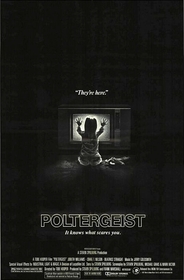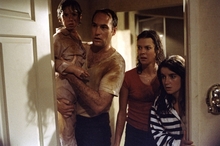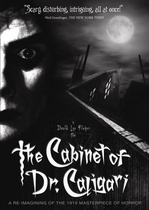Our editor-in-chief Nate Yapp is proud to have contributed to the new book Hidden Horror: A Celebration of 101 Underrated and Overlooked Fright Flicks, edited by Aaron Christensen. Another contributors include Anthony Timpone, B.J. Colangelo, Dave Alexander, Classic-Horror.com's own Robert C. Ring and John W. Bowen. Pick up a copy today from Amazon.com!
Poltergeist (1982)
Poltergeist is one of those slightly enigmatic films, chock full o' flaws from many perspectives -- including my own -- that is able to rise above its countless gaffes and play like a minor masterpiece. Unfortunately, it's much easier to point out the problems than it is to say why it works. Part of it may be more generational than due to anything inherent with the film. I first saw Poltergeist in the theater as a fifteen-year-old; many of the people who love this film are close to me in age and saw it during or near its first theatrical run. My wife, on the other hand, a bit older and from a different culture, basically hated the film. To her, there wasn't anything to overcome the flaws. On the third hand, things like ghosts scare her, and when I suggested we head down to the dingy, dirt-floored cellar of our building just for the hell of it after the film, she quickly declined, so it's hard to read exactly what her thoughts were.
For the first half-hour to forty minutes, Poltergeist is as much about life in suburbia as anything else. Implicit in the setting (and explicit in at least one of the film's trailers) is the fact that the house which is to serve as our primary locale is just like the house next to it, and the one next to that, and the one . . . The Freeling's, our family of protagonists, consists of pot-smoking parents--aging hippies who are now playing yuppies; a teenage daughter who is either on the phone or not in the same vicinity, physically or mentally, as the parents; and two young kids, a boy and a girl, the boy, at least, obsessed with pop culture (films, of course) like Star Wars, Alien, etc.
But it's not a drama, and isn't even really much of a critique of suburbia, or aging hippies, or anything that it brings up. That's not scripter Steven Spielberg's point. Poltergeist is a horror film, and where other writers would either forgo the dramatic and character development or focus on it in a postmodern derailment (like American Beauty, say), Spielberg is just laying out pizza dough so the meat and toppings have something to rest on.
Tobe Hooper supposedly directed Poltergeist. Famously, the story goes that Spielberg (who also served as producer and an uncredited editor) actually directed a lot of the film, if not most of it. That's not difficult to believe, as Poltergeist has everything in common with E.T. and Close Encounters of the Third Kind (and even Jaws to an extent) -- Spielberg films chronologically close to Poltergeist--and bears no resemblance to most of Hooper's films. With all the similarities to E.T. and Close Encounters, it's surprising that Poltergeist didn't end up being another alien film--at times, it almost seems to want to head in that direction, especially with the electromagnetic radiation theme. But Spielberg seems to not care for evil aliens, and he wanted to make a horror film. Ghosts and Satan asking to phone home just wouldn't have worked for most people. Unfortunately, Poltergeist also picks up the problems that plague E.T., and to a lesser extent Close Encounters.
Although they're certainly far from perfect, Spielberg wants to show a Hallmark family dropped into the middle of a fantastic situation. The problem is that his sentiments are a bit too sweet and syrupy, and the portrayal just doesn't ring true. Most of us are more dysfunctional than that. Our lives are not so clean. For depositing middle America in an unusual situation, Stephen King comes a lot closer to hitting the nail on the head. This fact makes the dramatic portions of Poltergeist a bit distracting, since you're wondering what planet these people are from. Some people think this problem plagues Spielberg's entire career, but I see it most pronounced in E.T. (especially) and Poltergeist, even if there are traces of it in the rest of Spielberg's work.
While we're on the flaws, others include the swathes of paranormal gobbledy-gook (well, "gobbledy-gook" is really redundant there) that bind the script, especially once we meet Tangina (and by the way, has anyone else recently noticed the politically incorrect munchkin jokes?), the terrible make-up effects (don't worry, I've already rapped Craig Reardon on the knuckles) during the "really bad zits" scene, and the excessive, Blair Witch Project-worthy screaming that reaches a fevered pitch in the climax (naturally).
Also, for my tastes, the transition from "maybe something weird is going on here" to "trees and closets are devouring my family" is a bit too abrupt, but I can understand conflicts about running time. It's difficult to know what would have been a better cut there. Another possible flaw, although this could have been the print my DVD was made from, was a horrendously awkward edit between the scene where Diane is showing Steve the kitchen phenomena and when they head to the neighbor's.
So, with all these problems, why the heck am I giving Poltergeist a strong recommendation? It's not just that this is an important film historically that you need to watch to earn the badge of "horror fan." It's that inexplicably, like E.T., none of the flaws count for much in the big picture. Poltergeist remains entertaining, thrilling and scary anyway, and that's part of what makes Spielberg such a great director. He can give you cotton candy but miraculously make it a fully balanced gourmet meal.









